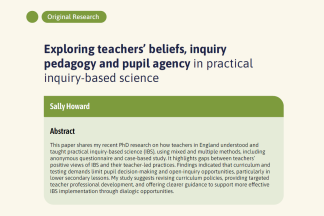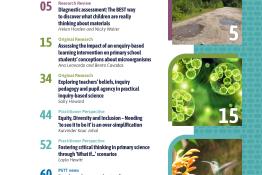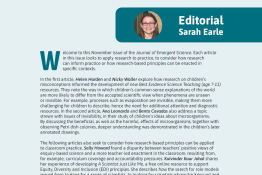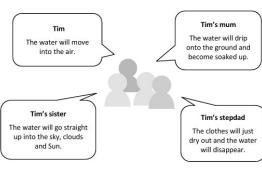Exploring teachers’ beliefs, inquiry pedagogy and pupil agency in practical inquiry-based science
Issue 29 | Page 34 | Published Nov 2025
Description
Abstract
This paper shares my recent PhD research on how teachers in England understood and taught practical inquiry-based science (IBS), using mixed and multiple methods, including anonymous questionnaire and case-based study. It highlights gaps between teachers’ positive views of IBS and their teacher-led practices. Findings indicated that curriculum and testing demands limit pupil decision-making and open-inquiry opportunities, particularly in lower secondary lessons. My study suggests revising curriculum policies, providing targeted teacher professional development, and offering clearer guidance to support more effective IBS implementation through dialogic opportunities.
References
Abd-El-Khalick, F. (2012) ‘Examining the sources for our understandings about science: Enduring conflations and critical issues in research on nature of science in science education’, International Journal of Science Education, 34, (3), 353–374. https://doi.org/10.1080/09500693.2011.629013
Abd-El-Khalick, F. & Lederman, N.G. (2000) ‘Improving science teachers’ conceptions of nature of science: A critical review of the literature’, International Journal of Science Education, 22, (7), 665–701. https://doi.org/10.1080/09500690050044044
Abrahams, I. & Millar, R. (2008) ‘Does practical work really work? A study of the effectiveness of practical work as a teaching and learning method in school science’, International Journal of Science Education, 30, (14), 1945–1969. https://doi.org/10.1080/09500690701749305
Abrahams, I. & Sharp, R. (2010) ‘What’s in a name? Practical and enquiry-based lessons in England and Wales’, School Science Review, 91, (335), 49–55
Alexander, R. (2006) Towards dialogic teaching: Rethinking classroom talk (3rd edition). Thirsk, UK: Dialogos
Anderson, R.D. (2002) ‘Reforming science teaching: What research says about inquiry’, Journal of Science Teacher Education, 13, (1), 1–12.
https://doi.org/10.1023/A:1015171124982
Ananiadou, K. & Claro, M. (2009) ‘21st century skills and competences for new millennium learners in OECD countries’, OECD Education Working Papers, No. 41. OECD Publishing. https://doi.org/10.1787/218525261154
Bächtold, M., Cross, R. & Munier, V. (2024) ‘Inquiry-based science teaching in international perspective’, Science Education International, 35, (2), 101–115
Bocock, J., Sharp, J. & Ritchie, R. (2025) Reimagining science education in turbulent times. Oxford: Education Futures
Capps, D.K. & Crawford, B.A. (2013) ‘Inquiry-Based Instruction and Teaching about the Nature of Science: Are They Happening?’, Journal of Science Teacher Education, (24), 497–526. https://www.jstor.org/stable/43670581
Capps, D.K., Shemwell, J.T. & Young, A.M. (2016) ‘Reconceptualizing context in the science classroom’, Science Education, 100, (3), 688–720.
https://doi.org/10.1002/sce.21223
Crawford, B.A. (2000) ‘Embracing the essence of inquiry: New roles for science teachers’, Journal of Research in Science Teaching, 37, (9), 916–937. https://doi.org/10.1002/1098-2736(200011)37:9<916::AID-TEA4>3.0.CO;2-2
Crawford, B.A. (2007) ‘Learning to teach science as inquiry in the rough and tumble of practice’, Journal of Research in Science Teaching, 44, (4), 613–642. https://doi.org/10.1002/tea.20157
Crawford, B.A. (2014) ‘From inquiry to scientific practices in the science classroom’. In: Handbook of Research on Science Education (Vol. II), Lederman, N.G. & Abell, S.K. (Eds.), pps. 515–541. Abingdon: Routledge
Dawson, V., Venville, G. & Donovan, J. (2024) ‘Preparing students for uncertain futures: The role of science education’, Science Education International, 35, (1), 16–24
DfE (2015) Science programmes of study: Key stages 3 and 4. National Curriculum in England. London: Department for Education
DfEE (1989) Science in the National Curriculum. London: Department for Education and Employment
Furtak, E.M., Seidel, T., Iverson, H. & Briggs, D.C. (2012) ‘Experimental and quasi-experimental studies of inquiry-based science teaching: A metaanalysis’, Review of Educational Research, 82, (3), 300–329. https://doi.org/10.3102/0034654312457206
Harlen, W. (2013) Assessment & inquiry-based science education: Issues in policy and practice. Trieste: Global Network of Science Academies
Mercer, N., Hennessy, S. & Warwick, P. (2025) ‘Classroom talk and collaborative reasoning: Towards a pedagogy of dialogue’, International Journal of Educational Research, (118), 102158. https://doi.org/10.1016/j.ijer.2022.102158
Minner, D.D., Levy, A.J. & Century, J. (2010) ‘Inquiry-based science instruction – what is it and does it matter? Results from a research synthesis years 1984 to 2002’, Journal of Research in Science Teaching, 47, (4), 474–496. https://doi.org/10.1002/tea.20347
Morris, D.L. (2025) ‘Rethinking Science Education Practices: Shifting from Investigation-Centric to Comprehensive Inquiry-Based Instruction’, Education Sciences. https://doi.org/10.3390/edusci15010073
Murray, I. & Reiss, M. (2012) ‘The student experience of practical work in school science’, School Science Review, 93, (344), 117–123
National Research Council (NRC) (1996) National Science Education Standards. Washington, DC: National Academies Press
National Research Council (NRC) (2000) Inquiry and the National Science Education Standards. Washington, DC: National Academies Press
National Research Council (NRC) (2013) Next Generation Science Standards: For states, by states. Washington, DC: National Academies Press
OECD (2018) The future of education and skills: Education 2030. Paris: OECD Publishing
OECD (2022) OECD skills outlook 2022: Skills and lifelong learning for the digital transition. Paris: OECD Publishing. https://doi.org/10.1787/61fe91d8-en
Ofsted (2015) Key Stage 3: The wasted years? Manchester: Ofsted
Ofsted (2023) Finding the optimum: The science subject report. Manchester: Ofsted
Quick, L. (2024) ‘Teaching to the test? Science teachers’ perspectives on curriculum narrowing and accountability in England’, Research in Science Education. Advance online publication. https://doi.org/10.1007/s11165-024-10123-5
Rocard, M. (2007) Science education now: A renewed pedagogy for the future of Europe. Brussels: European Commission Strat, T.T.S., Henriksen, E.K. & Jegstada, K.M. (2023) ‘Inquiry-based science education in science teacher education: A systematic review’, Studies in Science Education, 60, (2), 191–249. doi:10.1080/03057267.2023.2207148
Suárez, R., Segura, M. & Reuter, T. (2018) ‘Student agency and decision-making in inquiry-based learning’, Educational Practice and Theory, 30, (2), 41–56. https://doi.org/10.7459/ept/30.2.04
Tafoya, A., Sunal, D. & Knecht, P. (1980) ‘Assessing inquiry potential: A tool for curriculum decision makers’, School Science and Mathematics, 80, (1), 43–48. https://doi.org/10.1111/j.1949-8594.1980.tb09699.x
Tang, K.S., Delgado, C. & Moje, E.B. (2020) ‘Rethinking practice, theory, and research on science teaching, learning, and teacher education in the 21st century’, Journal of Research in Science Teaching, 57, (6), 843–855. https://doi.org/10.1002/tea.21645
Tao, P.K. & Chen, S. (2024) ‘Enhancing student agency through inquiry-based science learning’, International Journal of Science Education, 46, (2), 231–250
Tashakkori, A. & Creswell, J.W. (2007) ‘Editorial: The new era of mixed methods’, Journal of Mixed Methods Research, 1, (1), 3–7.
https://doi.org/10.1177/2345678906293042
Tight, M. (2017) Understanding case study research: Small-scale research with meaning. London: Sage
Wenning, C.J. (2007) ‘Assessing inquiry skills as a component of scientific literacy’, Journal of Physics Teacher Education Online, 4, (2), 21–24
More from this issue
Abstract
The Best Evidence Science Teaching (BEST) (7-11) ‘Materials and their properties’ resources have been developed by...




